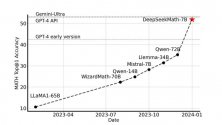World’s first AI child unveiled in Beijing by award-winning Chinese scientist who left US for China
- The AI entity has been unveiled at an exhibition by the Beijing Institute for General Artificial Intelligence
- Called Tong Tong, or Little Girl, she can assign herself tasks, learn autonomously and explore her environment
Science fiction has now become reality with the creation of Tong Tong, a girl who is the world’s first virtual
(AI) entity, developed by Chinese
.
Tong Tong, or Little Girl in English, the
entity was unveiled at the Frontiers of General Artificial Intelligence Technology Exhibition held in Beijing on January 28-29, under the auspices of the Beijing Institute for General Artificial Intelligence (BIGAI).
There, exhibition visitors could interact with Tong Tong. When programmed to like things tidy, she would fix a crooked picture frame on her own. If the frame was too high for her to reach, she would find a stool so she could straighten it without any help from a human. Also, if someone spilled milk, she would find a towel and clean it up by herself, showing her ability to interpret human intentions
Unlike popular
in AI, Tong Tong can independently assign tasks to herself, ranging from exploring her environment to tidying rooms and cleaning stains.
She is capable of autonomous learning and “has her own joy, anger and sorrow”, according to a video posted by BIGAI.
“Tong Tong possesses a mind and strives to understand the common sense taught by humans. She discerns right from wrong, expresses her attitudes in various situations, and has the power to shape the future,” the video says.
In terms of general artificial intelligence standards and testing tasks, Tong Tong displays behaviour and abilities akin to those of a three or four-year-old child. Through exploration and human interaction, she can continually improve her skills, knowledge and values.
A key aspect of general intelligence, as one researcher explained, is having physical and social common sense akin to humans. Driven by its own values, an AI entity should not only be capable of completing an infinite array of tasks, but should also define new ones autonomously.
“To advance towards general artificial intelligence, we must create entities that can comprehend the real world and possess a wide range of skills,” BIGAI director Zhu Songchun said.

